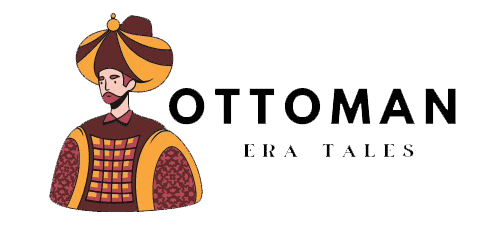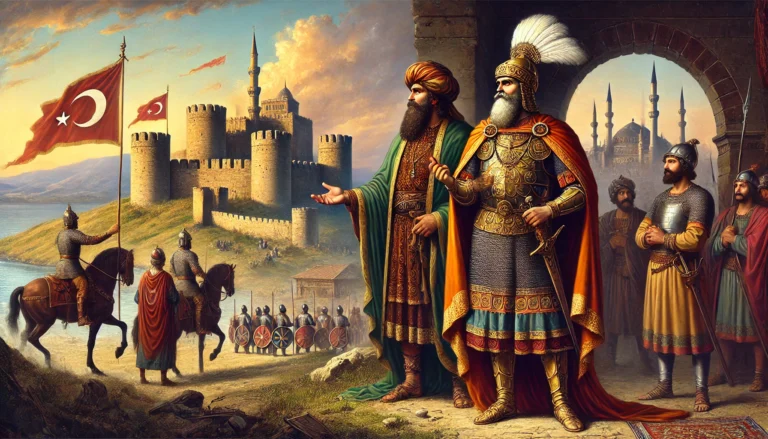Köse Mihal, a Byzantine nobleman who transitioned into a loyal ally of the Ottoman Empire, stands as a historical symbol of cultural synthesis and strategic alliances. Born into the waning Byzantine aristocracy, his life mirrors the tumultuous shifts in Anatolia during the late 13th and early 15th centuries. Mihal’s unique journey—from a Christian governor (takfir) to a prominent Muslim leader in the Ottoman ranks—offers deep insights into the dynamics of power and identity during the formative years of the Ottoman Empire.
Early Life and Background
Köse Mihal, born Michael Cosses, was a Byzantine noble who served as the governor of Harmankaya, a strategically important fortress near Eskisehir, Anatolia. The Byzantine Empire was then grappling with internal strife and external threats, particularly from the rising Turkish principalities. Mihal, like many Byzantine aristocrats of the time, was tasked with defending frontier territories against Turkish incursions. His position at the borderlands made him a key player in the conflict between the Byzantines and the emerging Ottoman principality under Osman I.
The epithet “Köse,” meaning “beardless,” is a distinguishing nickname that has cemented his legacy. Some historical accounts suggest it referred to his physical appearance, while others interpret it as a metaphor for his straightforward and unembellished approach to leadership. In these turbulent times, Mihal’s administrative skills and martial prowess were critical in maintaining the stability of Harmankaya. However, his initial confrontations with Osman I marked the beginning of an unlikely transformation.
Mihal’s early encounters with Osman I revealed a leader whose charisma and vision transcended the traditional divisions of faith and culture. Although initially an adversary of the Ottomans, Mihal’s respect for Osman’s sense of justice and leadership grew. This admiration set the stage for his eventual defection and conversion, marking one of the most significant turning points in his life.
Allegiance to the Ottomans
Köse Mihal’s shift from a Byzantine governor to a loyal Ottoman ally was rooted in both pragmatism and conviction. Following his capture and subsequent negotiations with Osman I, Mihal chose to embrace Islam and join the Ottoman ranks. This decision was not merely an act of survival; it was a calculated move driven by Mihal’s belief in Osman’s vision for a new kind of state—one characterized by inclusivity and justice.
His conversion to Islam was a momentous event, symbolizing the Ottoman Empire’s ability to assimilate diverse individuals and cultures. Köse Mihal became a trusted advisor to Osman I, offering invaluable insights into Byzantine politics, military strategies, and governance. This alliance was mutually beneficial: while Mihal secured a future for himself and his people, the Ottomans gained a knowledgeable and capable ally.
Köse Mihal’s role extended beyond diplomacy. He participated actively in Ottoman military campaigns, helping Osman I and later Orhan Gazi expand their territories. His deep understanding of Byzantine fortifications and tactics made him a critical asset in key battles. The alliance also showcased the Ottomans’ adaptability, as they effectively integrated former adversaries into their growing state.
Role in Ottoman Expansion
Köse Mihal’s contributions to Ottoman expansion were multifaceted, spanning both military and administrative domains. One of his most notable achievements was his role in the Battle of Bapheus (1302), a decisive encounter between Osman’s forces and the Byzantines. Mihal’s strategic advice and knowledge of Byzantine military formations played a crucial role in securing the Ottoman victory in this battle. The win at Bapheus marked a turning point, establishing the Ottomans as a formidable regional power and boosting their confidence to pursue further conquests.
Mihal’s familiarity with local terrain and Byzantine governance structures made him indispensable in the Ottoman campaigns. He also played a significant role in the Bursa siege, culminating in 1326 with the city’s capture. Bursa’s fall was a monumental victory for the Ottomans, as it became their first capital and a symbol of their growing dominance in Anatolia. Mihal’s contributions to this campaign cemented his reputation as a key architect of Ottoman success.
In addition to his military exploits, Mihal helped the Ottomans govern newly conquered territories. His ability to mediate between the Christian populations and the Muslim rulers eased transitions and minimized resistance. This harmonious integration was crucial for maintaining stability and fostering loyalty among diverse communities.
Legacy and Influence
The legacy of Köse Mihal is one of transformation, resilience, and unity. As a Byzantine noble who embraced Islam and became a pillar of the Ottoman state, he exemplified the pragmatic and inclusive policies that defined the early Ottoman Empire. His descendants, the Mihaloğulları family, played prominent roles in the Ottoman administration, maintaining their influence for generations.
Köse Mihal’s story is also a testament to the Ottomans’ approach to empire-building. By valuing talent and loyalty over ethnic or religious identity, the Ottomans created a diverse and resilient administrative and military framework. Mihal’s life symbolizes the potential for collaboration and coexistence, even amidst conflict.
Today, Köse Mihal is remembered as a bridge between two civilizations. His contributions to the Ottoman rise—both on the battlefield and in governance—underscore the importance of adaptability and vision in shaping history. His story resonates as a reminder of the power of alliances and the enduring legacy of those who transcend divisions to forge a greater future.
Conclusion
Köse Mihal’s journey from a Byzantine governor to a pivotal figure in the Ottoman Empire reflects the profound complexities of history during the transitional era of Anatolia. His life is a testament to the power of alliances built on mutual respect and shared vision. By aligning with Osman I and embracing Islam, Mihal not only secured his future but also contributed significantly to the foundation and expansion of one of history’s greatest empires.
Mihal’s legacy is a reminder of the Ottomans’ inclusive and pragmatic approach to state-building. His deep understanding of Byzantine governance and military strategy, combined with his diplomatic skills, played a crucial role in the early Ottoman conquests, particularly at the Battle of Bapheus and the Siege of Bursa. More than a military ally, Köse Mihal became a bridge between two civilizations, helping to foster harmony among diverse communities under Ottoman rule.
In celebrating Köse Mihal’s life, we gain valuable insights into the dynamics of cultural synthesis, leadership, and resilience. His story transcends the boundaries of religion and nationality, highlighting how collaboration and adaptability can shape the course of history. Köse Mihal’s contributions ensured that his name would be etched in history as a symbol of unity, loyalty, and transformation.


